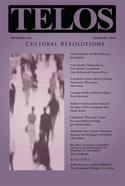By Telos Press · Monday, March 14, 2016 An important report by Alex Chalmers on antisemitic anti-Zionism and the scandal of Oxford University Labour Club (OULC) has just appeared at Fathom. An excerpt:
In a way, the antisemitic incidents I witnessed in OULC are less troubling than the culture which allowed such behaviour to become normalised. It is common to encounter antisemitic individuals in all walks of life, but the mass turning of a blind eye that has come to characterise vast parts of the Left is chilling. As antisemites can double up as vocal critics of Israel, there is a marked tendency on the Left to view them as fellow travellers whose hearts are in the right place – so their rhetoric passes the test of social acceptability.
Continue reading →
By Paolo Morisi · Friday, August 30, 2013 Paolo Morisi’s “Twentieth-Century British Christian Democratic Movements: The Search for a Political Space” appears in Telos 163 (Summer 2013). Read the full version online at the Telos Online website, or purchase a print copy of the issue in our store.
 One of the major British political anomalies vis-à-vis Europe is the lack of a Christian Democratic political party. In most European countries these parties are part of the political fabric of the nation, but in Britain Christian Democracy never developed into a party. Research has shown that during the twentieth century there were British groups that inspired by Catholic social thought were the closest approximation to Christian Democracy. They not only sought to influence the parties, but also introduced into domestic politics typical Christian Democratic concerns. Thus, this essay seeks to address the following questions: What were their aims and policies? How and in what ways did they influence the parties? What was their ideological outlook? Finally, were there ideological differences among these groups? One of the major British political anomalies vis-à-vis Europe is the lack of a Christian Democratic political party. In most European countries these parties are part of the political fabric of the nation, but in Britain Christian Democracy never developed into a party. Research has shown that during the twentieth century there were British groups that inspired by Catholic social thought were the closest approximation to Christian Democracy. They not only sought to influence the parties, but also introduced into domestic politics typical Christian Democratic concerns. Thus, this essay seeks to address the following questions: What were their aims and policies? How and in what ways did they influence the parties? What was their ideological outlook? Finally, were there ideological differences among these groups?
Continue reading →
By Timothy Stacey · Sunday, August 14, 2011 The past few days have seen the worst unrest in the UK since the 2001 Bradford Race Riots. Residents have watched from the questionable safety of their homes as mobs of men, women, boys, and girls attack and set light to shops, cars, and buses. Sometimes bystanders and journalists have been attacked too. Many have been shocked by the tendency of some to smash rather than steal expensive goods. The following is a dispassionate look at the facts and possible causes, followed by a controversially hopeful look into what the riots, and the reactions to them, might mean for the future of community in Britain.
Continue reading →
|
|
 One of the major British political anomalies vis-à-vis Europe is the lack of a Christian Democratic political party. In most European countries these parties are part of the political fabric of the nation, but in Britain Christian Democracy never developed into a party. Research has shown that during the twentieth century there were British groups that inspired by Catholic social thought were the closest approximation to Christian Democracy. They not only sought to influence the parties, but also introduced into domestic politics typical Christian Democratic concerns. Thus, this essay seeks to address the following questions: What were their aims and policies? How and in what ways did they influence the parties? What was their ideological outlook? Finally, were there ideological differences among these groups?
One of the major British political anomalies vis-à-vis Europe is the lack of a Christian Democratic political party. In most European countries these parties are part of the political fabric of the nation, but in Britain Christian Democracy never developed into a party. Research has shown that during the twentieth century there were British groups that inspired by Catholic social thought were the closest approximation to Christian Democracy. They not only sought to influence the parties, but also introduced into domestic politics typical Christian Democratic concerns. Thus, this essay seeks to address the following questions: What were their aims and policies? How and in what ways did they influence the parties? What was their ideological outlook? Finally, were there ideological differences among these groups? 






